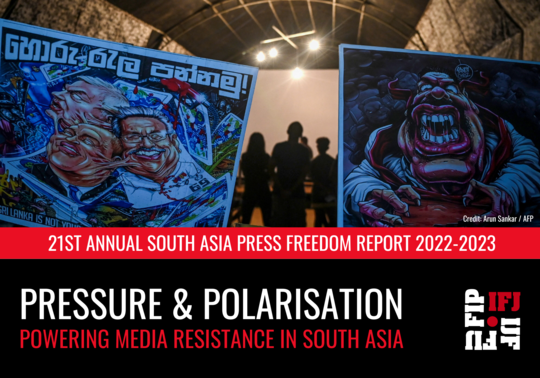The IFJ’s South Asia Press Freedom Report for 2022-2023 (SAPFR22-23), Pressure & Polarisation: Powering Media Resistance in South Asia, explores the complex interface between power and the fundamental human rights of press freedom and freedom of expressionacross the eight countries of South Asia, from May 1, 2022, to April 30, 2023. With support from the United Nations Educational, Scientific and Cultural Organisation (UNESCO), the European Commission (EC), Norsk Journalistlag (NJ) and the National Endowment for Democracy (NED), the report highlights the impact of increasing political and societal polarisation, digital disruption, and pandemic fallout on the region’s media industry.
The IFJ recorded a total of 257 media rights violations in the period, including the targeted killings of 13 journalists and media workers. Journalists across the region faced attacks, arrests, and detention with at least 76 media professionals jailed or detained, and over 163 assaulted, intimidated and harassed, often by law enforcement. At the time of publication, at least 10 journalists remain behind bars.
Amid the collapse of traditional media and mass journalist layoffs, the SAPFR22-23 highlights how evolving media organisations and platforms are exploring new models to build sustainability, with journalism as a profession changing how it delivers stories to a multi-faceted, diverse and increasingly digital audience.
Released on the 30th anniversary of the proclamation of World Press Freedom Day by the 48th UN General Assembly, the report also spotlights the ongoing plight of Afghan journalists exiled in Pakistan and beyond, and the extraordinary measures authorities have pursued to curb freedom of expression over the region’s recent elections. Gendered, religious, and other axes of oppression are ever-present in statistics of violence, abuse and lawfare.
Despite these challenges, South Asia’s media is working hard to strengthen public trust and reaffirm the vital role it plays as a pillar of those democracies despite the challenges. New pro-worker legislation and protections, union action, and high-quality, independent journalism continue despite attacks on the profession, with new and emerging alliances and collaborations addressing conditions, gender concerns, and advocating seen across the region.
The SAPFR22-23 will be formally launched on May 3 at UNESCO’s 2022 World Press Freedom Day event at the French Consulate General in Mumbai, India. The event will be attended by representatives from the IFJ and its Indian Affiliates.
The IFJ said: “In 2023, South Asia has seen many grave threats to press freedom and democratic institutions, with government overreach, violence, and jailings marring the region’s media landscape. Despite this, brave journalists are continuing to push back and speak out against polarisation, to tell the truth, shine a light, and defend hard-fought fundamental freedoms. It is more important than ever that we, as media workers, take stock of the challenges for media freedom and the safety of journalists, raise awareness and foster partnerships to defend media from attacks, and pay tribute to journalists who have lost their lives in the exercise of their work.”
The SAPFR22-23 is now available online: Pressure & Polarisation: Powering Media Resistance in South Asia
Individual country chapters are also available to download below:

